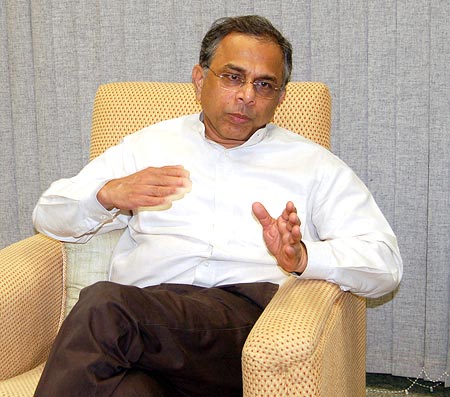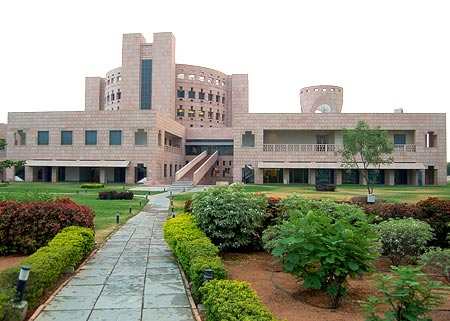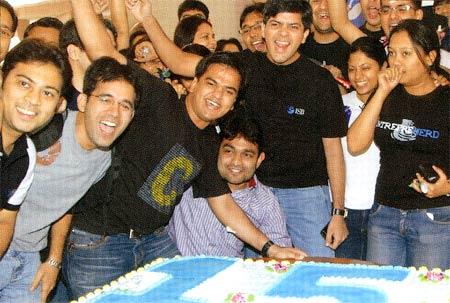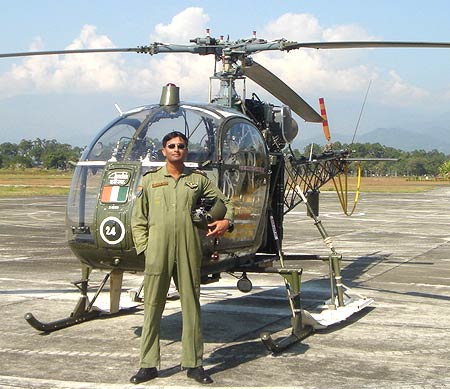Photographs: Prasanna D Zore
"What is the purpose of educational institutions? Are we placement agencies or are we educational institutions?" he asks angrily when asked how the ISB, Hyderabad, will place its students given the grim global economic conditions.
He believes an institution should not be judged on the basis of placements it provides its students, but by its ability to do social good even as it adds economic value to society.
He strongly feels the process of education has been killed in the mad race to find a lucrative job no sooner students graduate from university.
In an interview with Prasanna D Zore, the ISB dean discusses the Indian education system, the difficulties graduates face in the economic slowdown and why Indian business must be bold, but different.
What are your challenges given the way your predecessor resigned?
As a human being I feel sorry that Professor Rao (M B M Rao who resigned as the dean after the Satyam fallout; he was an independent director on Satyam's board) had to step down. I had and continue to have enormous respect for him.
But as a school it has had no impact on the ISB. We are continuing to grow exactly as planned three months ago or six months ago. Our plans, intentions and achievements are still the same. So we will go with the Mohali campus, expansion of students and creating new centres of excellence.
How soon will the Mohali campus come up?
We are aiming for 2011, but it could be in 2012.
The ISB has increased its class to 560 students this year. How will you overcome the challenge of giving placements to so many students given the current economic scenario?
This is one thing we really need to start moving away from. Educational institutions and society at large need to have a very strong debate on this.
What is the purpose of educational institutions? Are we placement agencies or are we educational institutions?
I very strongly and passionately believe that we should not be considered as placement agencies. Unfortunately, the only thing the media reports about educational institutions are the salaries that our students get. So you (the media) are using a very wrong parameter to judge an institution.
You people emphasise the salary that one student gets from whatever company. Is that the criteria?
Instead, the focus should be on the contribution of that educational institution to knowledge, what is the contribution of the alumni of that educational institution not to industry but to society at large.
Unless we don't move into those spheres we are going to get into these wrong choices.
The job of the educational institutions is to create high quality people who will contribute enormously to society. And that is what even we (the educational institutions) have to start focusing on.
'Indian parents will commit suicide rather accept their children going to an arts college'
Image: The ISB campus, HyderabadShouldn't institutions also take part of the blame? What factors have led to educational institutions being perceived as placement agencies?
The educational institutions are also responsible for blurring this line and there are a number of reasons why this line is blurred.
One is partly an assorted mentality. Those of us who grew in the shortage mentality -- you guys are too young to know what that means -- have had this oh-my-god-I-must-find-a-job issue. It is a survival issue.
When Nehru first initiated these (educational institutions like the IITs) they were temples of learning, temples of modern India. They were for transforming society. Unfortunately, apart from what happened in the 1950s and 1960s very, very few high quality institutes got started in the 1970s, 1980s and 1990s.
Some three to four lakh (300,000 to 400,000) people apply to the IITs and only 3,000 get in. What kind of a ridiculous shortage is that?
That shortage has created a desperate thought that come what may you have to get into these institutions. So with this process taking roots the whole process of education got killed.
From Class VIII itself you send your child to a coaching class or to Kota (where coaching classes that help prepare students for competitive examinations for institutions like the IIT are located) where whether the child likes it or not s/he has to get into either engineering or medicine.
I think an average Indian parent would commit suicide than rather accept that the child is going to an arts college to learn history. Especially if a boy says so.
No Indian family would want to say that my son is studying history. They would rather send him to a fourth grade, useless, engineering college. So it's our wrong mentality.
We have forgotten that education is for the enrichment of the mind. That's why we are putting a lot of emphasis on giving the message out that we value people with a non-engineering background. We want people who have done arts, literature, sports or have a armed forces background.
Because of that shortage you just put four, five, six years of your life to just get into these institutions and then expect a return.
Also, perversely what has happened is why are people going to the IITs? Not because they want to do engineering, but they want a job. And why is that happening? Because the IT industry is recruiting in large numbers.
But the IT industry can as well take a history graduate or a science graduate, anybody who can think logically, and train them in seven months or so. That's what happens in the rest of the world.
In that sense the growth of the BPO industry was a big boon to India because a young person who could speak English, could communicate well suddenly had an opportunity to get a decent living.
'Students knew they were in a tough market'
Image: ISB is among the top 15 global B-schoolsPhotographs: ISB Insight
When students came they knew they were in a tough market. But since then the market condition has slowly deteriorated.
When we knew that the domestic market was certainly very, very soft around September (2008) and at that time we all had trained our sights on the Middle Eastern and Far Eastern markets. So we knew that the US and Europe were sliding, but the Middle East was still booming and the Far East was still strong.
And India then was not that bad. So all of us had reasonable confidence that we will find reasonably interesting careers for our students.
Then came the middle of September (2008) when the first financial meltdown happened. Then somewhere around January the Middle East bubble burst in just about a week. So there have been a number of setbacks.
Obviously, it's not a great position for a young student who has come here with dreams. Fortunately, we have got more mature students and they understand what is happening around them.
We on our part are stressing the fact that their long-term career will not be affected. Also, we have to work with these students to find alternatives. And that is happening.
So we are reaching out to a number of newer kind of companies -- in healthcare, consumer care, pharmaceuticals -- and that is very exciting.
For me as a school it is interesting because the more a management student goes to varied industries the better it is going to be for the companies. Far too many management grads were going to IT, financial services. That kind of distortions is likely to be corrected in this new scenario.
Also, the perception of what is good and what is risky has changed.
Do you handhold students to start ventures?
We don't handhold our students. Full stop. We think they are adults and they are going to be leaders. We hope we never have to do that because I think that will be a failure. However, we have always been very supportive of our students starting their own ventures.
If some of our students want to go for start-ups we will fund them. In addition, we are also encouraging our students to work with start-up companies if they are not starting on their own and have a share in the long-term benefit of start-ups.
Apart from this one of the most fundamental philosophy that we inculcate in our students is that it is important to do good. And you should make money while doing good.
Today the root of all the problems is that we thought of first making money, becoming greedy about making money, becoming stupidly greedy about it, taking idiotic risks. We want to change this.
It is not wrong to make money. I don't know how many people will take it though.
Do you feel vindicated that the one-year course is getting recognition now that many IIMs have also come up with similar management programmes?
When we first started with it people thought that the one-year course is not going to work. But we proved our sceptics wrong by our success. When other people come into your space and follow you, actually what happens is that the demand goes up.
I think this development is great because eventually we all will start cooperating with each other and learn from each other.
This is a country of 1.1 billion people. Take whatever fraction of this number, which will demand higher education, and what competition are you talking about?
In this country we should never think about competition, but about planning and executing our expansion.
When the prime minister was here he talked about making 100 more ISBs. That is the right vision.
'Each society has its wisdom'
Image: Flying instructor Lieutenant Colonel (retd) Gourav Ray, an ISB alumniPhotographs: ISB
I want to make the ISB a very dominant force that creates a lot of good: First for Indian society and then for the world. Let me explain.
Our first phase was to produce great students for the top industry. But our next phase has to be to look at the rest of the country. And this financial turmoil has proven it once again.
The only way in which we can insulate ourselves is to create a huge internal demand and capability. And you can't do it if the 300 million, 500 million or 800 million -- whatever numbers you take -- people are unproductive.
For them to be productive they must be properly skilled. They must have proper education and healthcare. Then jobs are not where they live. So then there must be affordable housing for them. Then we must have affordable and clean energy.
So unless we focus on these issues of society centred on affordability we can't help society. And we must do it fast, we must do it with a deep impact and we must do it on a big scale.
If you are going to do something that changes the life of only 50 or 100 people then you are neither here nor there.
So our job as an educational institute is to come out with new ways of doing these things: Give affordable healthcare, education and still make it profitable for the entrepreneur to do it. So social ventures -- to put it mildly -- must be our focus.
Ten years from now when the ISB can point out and say we were a positive impact on society, that is when I will feel that we have arrived.
And the next stage is to have a positive impact in all those developing countries across the world. Then I would say that we have done our job.
Everybody's talking about the social good. Is there a paradigm shift in the way Indian educational institutions as well as corporates are thinking now? Is the current economic scenario responsible for this change in thinking?
I hope we do start thinking about the social good. This is like a dash of cold water. I do believe that Indian industry got carried away in 2007 and 2008 and I actually believe that it has become too scared today.
I think Indian industry overreacted. This is our opportunity to take centre stage.
Now is the time for Indian industry to be bold, aggressive, but in a different way from what they have done earlier. While earlier the only motive was making money can we bring in a different perspective even as we make money?
In the leadership initiative that we have started we are telling people not to forget their roots and values.
Each society has its wisdom. We remember these values at home, but forget about them when we go to work.
The key issue is can we take these values and wisdom and try to create a new paradigm. That certainly is going to be our attempt. I don't know where we will reach though.





Comment
article